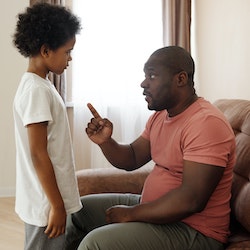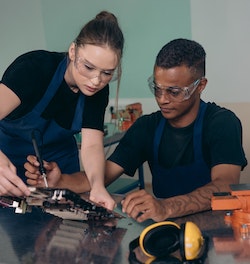Reflective parenting can lead to healthy child development and can protect against the negative impact of stress and adversity.

My toddler was playing with a shape sorter and started getting frustrated (he was trying to put a square peg in a round hole. Ha. Ha.). Being the helpful dad that I am, I moved the shape to the correct spot. He looked at me straight in the eye and crawled off to play with something else. He never played with the shape sorter again.
Why did I put the peg into the hole instead of letting him figure it out? Was it because I didn’t want him to have to struggle? No. I did it because I didn’t like the feeling of watching him struggle.
I did it for ME, not for him.
Parents have great difficulty tolerating their children’s frustration. As a result, kids are now rewarded and praised for just about anything, and most of it is done for the parent, not the child. Sorting out the difference (is it your feeling or my feeling?) has become a major challenge. That’s where reflective parenting can help.
When my eldest was a baby, I participated in a reflective parenting group. The group started with parents sitting in a circle observing the kids. Time and again I wanted to intervene to help my daughter reach something or to stop a kid from drooling on her. But the parents had to sit with the discomfort. Why did I want to help my daughter reach that toy? Like the shape sorter, I realized that it was because I did not like the feeling of watching her struggle.
I wanted to intervene for ME, not for her.
Reflective parenting is understanding that a child is motivated by what’s going on inside their mind and that parents are triggered by what’s in the parent’s mind. Thus, it was my job to figure out why I wasn’t able to tolerate that feeling. Let me elaborate on the three main principles to consider.
Understand your child’s perspective as well as your own
One day last year, I picked up my tween from school and asked how her day was. “Fine,” she said. “What did you do?” I asked. “Nothing,” she replied. It pissed me off. Here I was, taking time to pick her up and she wouldn’t even talk to me. How ungrateful. I knew I should have had that “eject” button installed.
But as I reflected later, I realized that she hadn’t done anything wrong. She was decompressing after a day in 6th grade. Who knows what social drama she was dealing with? Maybe she was thinking about a boy (I need to have a word with that boy).
Reflective parenting requires that parents look inside themselves – to their emotions, expectations, and even their childhood memories – and then recognize when these may be shaping their perception of their child. Maybe I was triggered because my parents never picked me up from school, and I thought that my daughter was incredibly fortunate to have her dad pick her up?
But that’s on ME. That has nothing to do with her.
Dr. Regina Pally, co-founder of the Center for Reflective Communities explained to me that “the reflective approach keeps parents on the lookout for the possibility of their own painful emotions interfering in their child’s ability to develop resilience.”
Tolerate ambiguity and uncertainty
Parents have a very difficult time watching their children struggle and often jump in to fix the problem. Why shouldn’t I ask a parent to make their child include mine? Doesn’t it make sense to call the principal if your child thinks they got an unfair grade? Don’t these small acts make it just a little easier for children to reach their potential?
In short, no.
The above “logic” is backward. It may seem like an easier way to parent. But in the long run, it will certainly have negative consequences and is an extremely difficult pattern to break. It’s important to be able to sit with the excruciating discomfort we feel when we see our kids struggle.
Foster closeness while also promoting independence
Think about when you speak to a friend about a problem. A close friend can’t fix your issues for you. A real friend listens, gives advice, and offers honest feedback – even when it’s not something we want to hear at the time. Those are the moments when relationships are fortified. It’s the same when we are dealing with our kids.
Parents are often fearful of harming their relationship with their kids. If we let them struggle without stepping in, aren’t we letting them down? The answer is absolutely not. It may seem counterintuitive, but letting kids work through their problems while making sure they know you are there in a supportive role actually fosters closeness. At the same time, it promotes independence and problem-solving skills.
Why be a reflective parent?
Research conducted in Reflective Parenting groups run by the Center for Reflective Communities has shown that reflective capacity is the factor most closely associated with healthy child development.
“A reflective mindset can help ease the pain and reduce the impulse to fix or to plow away the difficulties a child is having,” Pally says. “It can lessen the fear of letting go so parents don’t feel the need to control or manage every move their child makes.”
And if parents are able to identify their triggers, we can all stop doing what feels good to us and work on giving our kids the space to develop resilience and independence.


